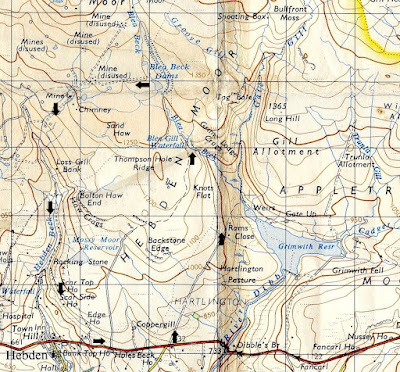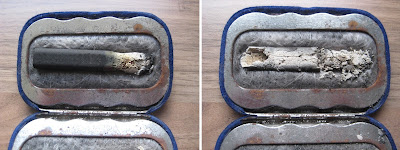New Month Old Post: first posted 3rd February, 2019. (Not that old, but few current followers will have seen it).
I always assumed we would see each other again one day. We would go to the pub and get pissed and laugh about the people and the good times in the shared houses in Leeds. But it was not to be.
We would remember Ron, the guy who never stopped talking, notorious for ‘ronopolising’ the conversation with his mind-numbing ‘ronologues’ which always began “Did I tell you about the time I …”, and if you had ever been somewhere, done something or seen something, he had always been somewhere, done something or seen something better. He used to leave his towel draped over the hot water cylinder in the bathroom and it stank. He never washed it. You would think a hospital bacteriology technician would have been worried about bugs.
And Pete, who gassed the place out with the peculiar aromatic smell of
Holland House pipe tobacco. He smoked even when it was his turn to cook, speckling the plates with ash. He once accidentally tipped the thing over my food and instead of being sorry just laughed and got on with his own unconcerned. Anyone would think he owned the place. Actually, he did. He was always asking “Can I trouble you gentlemen for some rent please?”
Then there was Nick, who could swear like only someone from the back streets of Manchester could, and Larry who made himself dainty little jellies and custards every Monday and lined them up uncovered on the kitchen table for several days (we had no fridge). And Roger, the Ph.D. student with his clever cryptic comebacks, and Paul with the outrageous ginger beard and silly Lancashire accent. And Gavin who was so well organised you had to make an appointment three weeks in advance just to ask him something. And Dave, the Geordie, who did an animated rendition of
The Lampton Worm, and was on holiday when the electoral register form came, so we put his middle name down as Aloysius.
And who could forget ‘Pervy Pete’, the television rent collector, who came each month to empty the coin box, greeted us “hello mensies”, and lingered uninvited to take an unseemly interest in which bedrooms we slept? That television always ran out of money right in the middle of
Monty Python or just before a punchline in
Jokers Wild.
The others came and went, but Brendan and I stayed longest. We were from ordinary Yorkshire backgrounds, shared the same sense of humour and had under-achieved our ‘A’ Levels. Brendan was the liveliest among us, and the best looking. In his long Afghan coat, with his smooth young face and long centrally-parted hair, the kids in the street called him “that lad who looks like David Cassidy.” He made us laugh with his silly puns and deliberate misunderstandings. He could play guitar better than me and instantly put chords to almost any song at all. He could throw a lighted cigarette in the air and catch it the right way round in his mouth. He had an impossibly beautiful girl friend who was training to be a doctor.
We were both desperate to escape our mundane jobs, me from an accountants’ office and Brendan from a veterinary laboratory, and did so around the same time in 1977, me to university and Brendan on Voluntary Service Overseas (VSO). He dreamed of some idyllic tropical paradise where nubile young girls danced to the drum-beat naked in the twilight, and was dismayed to be sent to sub-Saharan Africa, to an isolated rural village in Northern Ghana called Pong-Tamale, around 400 miles from the coast. It was not even much of a change of job: he went to run a laboratory in a veterinary college.
In those days, people still wrote letters, and I looked forward to his aerograms dropping through the letterbox with their exotic stamps and tales of distant Africa. Things were not easy. It was oppressively hot. He suffered tropical ailments and diseases. They were short of supplies and equipment. He asked to be sent books as there was little to read and no television, not that they always had electricity to run one.
Yet, after an initial term of eighteen months, he decided to stay. He found a salaried post for three years with the Overseas Development Ministry in the city of Kumasi, about two hundred and fifty miles to the south. Then, after a year back in England, he found a post at Mtwara in Tanzania, and then another at Morogoro. It sounded like a television wildlife documentary: horses, Land Rovers, lions, zebras, and trekking in the Ngorongoro highlands.
I saw him a couple of times over these years during his brief visits home. He was now married with children, and I was busy with my life too. Letters became less frequent. He suggested I visit them in East Africa but it was never the right time.
Then we lost touch. We both moved within a short space of time and I no longer had his address. Due to a downturn in the property market, we rented out my wife’s house where we had been living, and it was ten years before we finally sold it. In emptying it we came across various papers stuffed at the back of a cupboard by tenants, including a ten year old unopened letter from Brendan.
Replying after ten years seemed pointless. Perhaps I should have tried to find him, but didn’t. Did I fear the collision of past and present? We had surely both moved on.
But, it was already too late, as I distressingly discovered yet another decade later. Out of pure curiosity, I typed his distinctive name into a genealogy web site and was shaken to find a record of his death in 2001. It took more time to find what had happened. They had returned permanently to England in the nineteen-nineties, and Brendan had died suddenly of a massive heart attack at the age of 49. He had been living less than ten miles away. All that time ago, and I had no idea.
We’ll never have that drink now.
.jpg)















































